|
|
|
Sort Order |
|
|
|
Items / Page
|
|
|
|
|
|
|
| Srl | Item |
| 1 |
ID:
157419
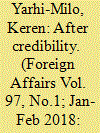

|
|
|
|
|
| Summary/Abstract |
Believe me.” U.S. President Donald Trump has used that phrase countless times, whether he is talking about counterterrorism (“I know more about ISIS than the generals do. Believe me”), building a wall along the U.S.-Mexican border (“Believe me, one way or the other, we’re going to get that wall”), or the Iran nuclear deal (“Believe me. Oh, believe me. . . . It’s a bad deal”).
|
|
|
|
|
|
|
|
|
|
|
|
|
|
|
|
| 2 |
ID:
157415
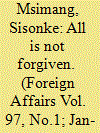

|
|
|
|
|
| Summary/Abstract |
In old black-and-white photographs, the antiapartheid activist Ahmed Timol looks elegant, with an open face and a ready smile. One classic shot captures him midstride. Clad in dark sunglasses with a pipe dangling from his mouth, he has the dashing air of a 1950s film star. Shortly after that photo was taken, on October 25, 1971, Timol—a member of the South African Communist Party—was arrested. Two days later, he was dead. His body was found on the pavement outside the headquarters of the notorious Security Branch of the apartheid police in Johannesburg. An inquest overseen by an apartheid judge determined that Timol had committed suicide by jumping from a window. He was not yet 30.
|
|
|
|
|
|
|
|
|
|
|
|
|
|
|
|
| 3 |
ID:
157411
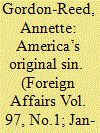

|
|
|
|
|
| Summary/Abstract |
The documents most closely associated with the creation of the United States—the Declaration of Independence and the Constitution—present a problem with which Americans have been contending from the country’s beginning: how to reconcile the values espoused in those texts with the United States’ original sin of slavery, the flaw that marred the country’s creation, warped its prospects, and eventually plunged it into civil war. The Declaration of Independence had a specific purpose: to cut the ties between the American colonies and Great Britain and establish a new country that would take its place among the nations of the world. But thanks to the vaulting language of its famous preamble, the document instantly came to mean more than that. Its confident statement that “all men are created equal,” with “unalienable Rights” to “Life, Liberty, and the pursuit of Happiness,” put notions of freedom and equality at the heart of the American experiment. Yet it was written by a slave owner, Thomas Jefferson, and released into 13 colonies that all, to one degree or another, allowed slavery.
|
|
|
|
|
|
|
|
|
|
|
|
|
|
|
|
| 4 |
ID:
157414
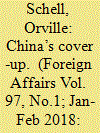

|
|
|
|
|
| Summary/Abstract |
The Chinese Communist leader Mao Zedong’s “permanent revolution” destroyed tens of millions of lives. From the communist victory in 1949 in the Chinese Civil War, through the upheaval, famine, and bloodletting of the Great Leap Forward and the Cultural Revolution, until Mao’s death in 1976, the Chinese Communist Party (CCP) set segments of Chinese society against one another in successive spasms of violent class warfare. As wave after wave of savagery swept China, millions were killed and millions more sent off to “reform through labor” and ruination.
|
|
|
|
|
|
|
|
|
|
|
|
|
|
|
|
| 5 |
ID:
157422
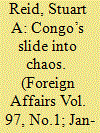

|
|
|
|
|
| Summary/Abstract |
On January 16, 2001, the Democratic Republic of the Congo tumbled into uncertainty. The country’s president, Laurent Kabila, had been sitting in his office at his marble palace in Kinshasa, the capital, when one of his teenage bodyguards entered, drew his pistol, aimed it at Kabila, and fired several times.
|
|
|
|
|
|
|
|
|
|
|
|
|
|
|
|
| 6 |
ID:
157413
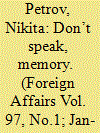

|
|
|
|
|
| Summary/Abstract |
Every spring, buses covered in portraits of Joseph Stalin appear on the streets of Russian cities. His face replaces ads for cell phones, soft drinks, laundry detergent, and cat food. With each passing year, the dictator gets more handsome and more glamorous; a portrait of him in his gorgeous white generalissimo’s jacket has become especially popular. He casts his stern gaze on the citizens, as if to say, “Remember me? I’m here, I didn’t go anywhere—and don’t you forget it!”
|
|
|
|
|
|
|
|
|
|
|
|
|
|
|
|
| 7 |
ID:
157412


|
|
|
|
|
| Summary/Abstract |
Defeated regimes are not only swiftly removed from power but often immediately erased from memory as well. When Adolf Hitler’s “thousand-year German Reich” came crashing down in 1945 with the Allied victory in World War II, reminders of the 12 years of its actual existence were hastily scrubbed away as Germans scrambled to adjust to life after Nazism. Stone swastikas were chiseled off the façades of buildings, Nazi insignia were taken down from flagpoles, and, in towns and cities across Germany, streets and squares named after Hitler reverted to their previous designations.
|
|
|
|
|
|
|
|
|
|
|
|
|
|
|
|
| 8 |
ID:
157417


|
|
|
|
|
| Summary/Abstract |
During the Cold War, the United States and the Soviet Union faced off in an existential struggle between two antithetical systems. Either the Soviet bloc would “bury” the West, as Soviet Premier Nikita Khrushchev threatened in 1956, or Western principles of democratic accountability, individual rights, and the rule of law would triumph over Soviet totalitarianism. The eventual outcome—the demise of the Soviet system and the expansion of the U.S.-led international order—showed that military power is essential to American national security but also that the United States must advance its goals through the quiet resilience of democratic institutions and the attractive pull of alliances.
|
|
|
|
|
|
|
|
|
|
|
|
|
|
|
|
| 9 |
ID:
157420


|
|
|
|
|
| Summary/Abstract |
Governing is always hard in polarized times, but it has been especially hard during U.S. President Donald Trump’s first year in office. Undisciplined and unpopular, Trump has been largely unable to advance his agenda on Capitol Hill despite Republican control of both houses of Congress. With his political capital shrinking as his public approval falls, Trump will no doubt struggle to deliver on his campaign promises to repeal the Affordable Care Act, reform the tax code, build a wall along the southern border, and repair the nation’s crumbling infrastructure.
|
|
|
|
|
|
|
|
|
|
|
|
|
|
|
|
| 10 |
ID:
157423


|
|
|
|
|
| Summary/Abstract |
In June, Saudi Arabia will make it legal for women to drive, marking the end of one of the world’s most conspicuous examples of gender discrimination. The ban’s removal has been rightly hailed as a victory in a country that systematically limits women’s freedoms. But for Saudi officials, this policy reversal has more to do with economics than concern for women’s rights. In recent years, even culturally conservative countries such as the Gulf kingdom have begun to recognize that they cannot get ahead if they leave half of their human capital behind.
|
|
|
|
|
|
|
|
|
|
|
|
|
|
|
|
| 11 |
ID:
157421
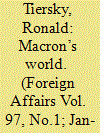

|
|
|
|
|
| Summary/Abstract |
In 2015, before resigning his position as economy minister in President François Hollande’s government, Emmanuel Macron explained his idea of French democracy to the newspaper Le 1. “Democracy,” he said, “always implies some kind of incompleteness. . . . In French politics, this absence is the figure of the king, whose death I fundamentally believe the French people did not want.”
|
|
|
|
|
|
|
|
|
|
|
|
|
|
|
|
| 12 |
ID:
157416


|
|
|
|
|
| Summary/Abstract |
When the Rwandan Patriotic Front (RPF), the rebel movement led by Paul Kagame, captured control of Rwanda and halted the genocide in July 1994, it inherited not so much a state as a cemetery. In the preceding 100 days, 800,000 people out of a national population of seven million had been murdered, the majority by their neighbors and other civilians. Seventy percent of all Tutsis, the ethnic minority that had been the target of the Hutu génocidaires, were dead, along with 30 percent of all Twas, the smallest of Rwanda’s ethnic groups. Throughout Rwanda, roads, rivers, and pit latrines were clogged with rotting corpses. The infrastructure of the country—houses, roads, hospitals, offices, schools, power stations, and reservoirs—lay in ruins. Nearly all government workers—politicians, judges, civil servants, doctors, nurses, and teachers—had died or fled. Looters had emptied the banks, leaving the national treasury without a single Rwandan franc.
|
|
|
|
|
|
|
|
|
|
|
|
|
|
|
|
| 13 |
ID:
157424


|
|
|
|
|
| Summary/Abstract |
It has been more than eight years since many of the United States’ cashiers, dishwashers, janitors, lifeguards, baggage handlers, baristas, manicurists, retail employees, housekeepers, construction laborers, home health aides, security guards, and other minimum-wage workers last got a raise. The federal minimum wage now stands at just $7.25. In real terms, these workers’ earnings have declined by nearly 13 percent since the last hike, in 2009—and have fallen by over one-third since 1968, when the real federal minimum wage was at its peak of $11.38 in today’s money (although only $1.60 then). Although most Americans think the minimum wage should go up—one 2017 poll found that 75 percent supported raising it to $9.00 per hour—today’s Republican-controlled Congress is unlikely to act.
|
|
|
|
|
|
|
|
|
|
|
|
|
|
|
|
| 14 |
ID:
157418
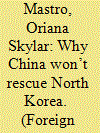

|
|
|
|
|
| Summary/Abstract |
U.S. officials have long agreed with Mao Zedong’s famous formulation about relations between China and North Korea: the two countries are like “lips and teeth.” Pyongyang depends heavily on Beijing for energy, food, and most of its meager trade with the outside world, and so successive U.S. administrations have tried to enlist the Chinese in their attempts to denuclearize North Korea. U.S. President Donald Trump has bought into this logic, alternately pleading for Chinese help and threatening action if China does not do more. In the same vein, policymakers have assumed that if North Korea collapsed or became embroiled in a war with the United States, China would try to support its cherished client from afar, and potentially even deploy troops along the border to prevent a refugee crisis from spilling over into China.
|
|
|
|
|
|
|
|
|
|
|
|
|
|
|
|
|
|
|
|
|